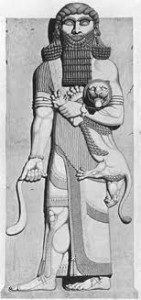 Just how dominant is Christianity in Western Culture? To find out, you don’t have to look much further than the recent stories about the “truth” of Noah’s Ark and the flood which were written about in the book of Genesis. There’s probably more evidence for the existence of Sasquatch than the existence of Noah and his ark, but our media always tends to treat folks like the mythical Noah as if they were actual flesh and blood people. If a character is “Biblical” they are afforded a level of historicity that individuals like King Arthur and Jason (of the Argonauts) are not.
Just how dominant is Christianity in Western Culture? To find out, you don’t have to look much further than the recent stories about the “truth” of Noah’s Ark and the flood which were written about in the book of Genesis. There’s probably more evidence for the existence of Sasquatch than the existence of Noah and his ark, but our media always tends to treat folks like the mythical Noah as if they were actual flesh and blood people. If a character is “Biblical” they are afforded a level of historicity that individuals like King Arthur and Jason (of the Argonauts) are not.
I don’t consider calling something “mythical” an insult. I believe in many myths, and they form the foundation of my belief system, but I don’t have to believe them in a literal sense. In Greek myth, Dionysus married the mortal woman Ariadne and she became a goddess in her own right. I don’t believe that literally happened, but the myth points to the idea that by worshipping Dionysus one can gain a measure of immortality. It’s a story designed to illustrate a truth.
The story of Noah and his ark is designed to do the same thing, illustrate a truth in the form of a story. In the case of Noah, the point is don’t piss off Yahweh or he’ll (in his own words) “wipe from the face of the earth every living creature I have made.” Obviously things didn’t happen exactly like that. There are too many animals from too much varied genetic stock for all creatures to have come from one coupling. Noah’s mythical boat is thought to have been very big (and certainly very smelly), but there’s no way it could have been large enough for an entire menagerie of Earth’s animals. In some ways the story of Noah is kind of like one of Aesop’s Fables, it’s an attempt tell you something, with Noah being about as real as Aesop’s Town and Country Mouses.
 Mythology often has kernels of historical truth, and the story of Noah might be an example of that. Underneath the headlines about “The Biblical Flood” a different narrative emerges. Yes, it appears there was a giant flood affecting the area around the Black Sea 7000 years ago (5000 BCE), but that doesn’t make the flood “Biblical.” The researchers claim that a giant rush of water swept in from the Mediterranean Sea and poured into the Black Sea, causing a major flood extending for thousands of square miles. I’ve heard this theory before (I keep up on my religion news), and the science behind it seems pretty good (the main researcher in the current crop of stories is Robert Ballard, who discovered the remains of the Titanic in 1985), but a giant flood caused from glacial runoff is not “raining for forty days and forty nights.” It’s geological, not Biblical.
Mythology often has kernels of historical truth, and the story of Noah might be an example of that. Underneath the headlines about “The Biblical Flood” a different narrative emerges. Yes, it appears there was a giant flood affecting the area around the Black Sea 7000 years ago (5000 BCE), but that doesn’t make the flood “Biblical.” The researchers claim that a giant rush of water swept in from the Mediterranean Sea and poured into the Black Sea, causing a major flood extending for thousands of square miles. I’ve heard this theory before (I keep up on my religion news), and the science behind it seems pretty good (the main researcher in the current crop of stories is Robert Ballard, who discovered the remains of the Titanic in 1985), but a giant flood caused from glacial runoff is not “raining for forty days and forty nights.” It’s geological, not Biblical.
Stories of arks and floods appear in many cultures. A flood appears in the legend of Gilgamesh, but I don’t take that whole account literally, even though most historians think Gilgamesh was a real person. The Greeks had three different flood stories, and there were some told by the people of the Americas as well. This doesn’t mean a giant flood covered the world and that we are all the descendants of Noah and his family, it simply means that when great floods happened in antiquity, mythology arose to explain them. Trying to connect an ancient flood to a non-historical personage is intellectually dishonest. It probably helps drum up interest in a story, but I don’t think it makes good for science of history.
 The media is to blame for a lot of these problems, there’s big money in keeping Christians happy. If someone were to suggest that the story of Moses and the Exodus is more mythological than factual they might be met with protest. Scientists and researchers who have to constantly seek funding know that inserting language that implies The Bible is literally true will make people more likely to open up their wallets. (Many archeological digs are funded by Christian groups for the express purpose of “proving” the Bible, again that might make for interesting research, but it doesn’t make for good science.) I understand the importance of drawing eyeballs and coming up with funding (I really do!) but it all could be done in a much more honest sort of way. Every once in awhile I’d like to see a few quotes in there from The Skeptical Inquirer; at least bump the actual “facts” up a few paragraphs and tone down the hysteria please.
The media is to blame for a lot of these problems, there’s big money in keeping Christians happy. If someone were to suggest that the story of Moses and the Exodus is more mythological than factual they might be met with protest. Scientists and researchers who have to constantly seek funding know that inserting language that implies The Bible is literally true will make people more likely to open up their wallets. (Many archeological digs are funded by Christian groups for the express purpose of “proving” the Bible, again that might make for interesting research, but it doesn’t make for good science.) I understand the importance of drawing eyeballs and coming up with funding (I really do!) but it all could be done in a much more honest sort of way. Every once in awhile I’d like to see a few quotes in there from The Skeptical Inquirer; at least bump the actual “facts” up a few paragraphs and tone down the hysteria please.
No one goes off looking for The Golden Fleece anymore, and if they did they’d probably be ridiculed. What our culture doesn’t ridicule are silly attempts to look for fictional objects like Noah’s Ark. This summer the search for Noah’s Ark by former Playboy model Donna D’Errico was all over the news. Strangely no one asked her the question “the ark was made of wood, don’t you think it would have rotted away by now?” But hey, it’s The Bible, the one piece of mythology our culture has decided is somehow literally true even when there’s no evidence for that being the case.
















